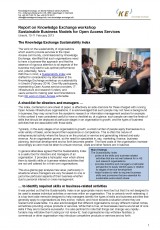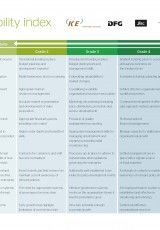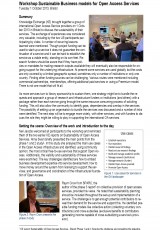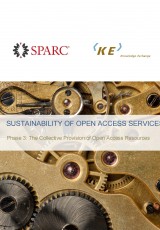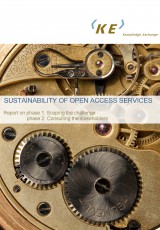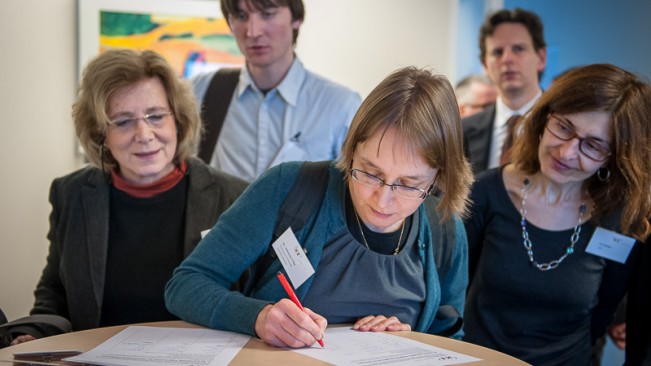
Over the past few years a number of infrastructure services have been developed in support of Open Access (in both repository and journal forms). Many of these start as projects and face some difficulties in becoming services. Infrastructure and content services in the subscription publishing model are funded by payments by publishers (e.g. CrossRef, DOI) or libraries (e.g. Web of Knowledge) or both. These form an established ecosystem whose financial sustainability has been guaranteed by a library budget (broadly defined to include consortia and other shared approaches) that is now challenged both by financial constraints and by additional calls on that budget to support a new infrastructure and content services for Open Access. In order to address this situation a programme of work has been designed to improve the extent to which the infrastructure and content services required to support OA can be sustained, and that longevity managed across the community.
The work was undertaken in five phases:
Phases 1 & 2: Scoping and Stakeholder Engagement
Phase one was a scoping exercise, carried out mainly through a literature review and an extensive stakeholder interview exercise, to describe the services that are currently available or would be valuable in the future. It also investigated what roles stakeholders could play in this future scenario.
Phase two was a stakeholder consultation and engagement exercise. The aim was to engage stakeholders with the work programme so that they could contribute their views, get involved with the work and have a voice in the thinking about future scenarios.
The resulting report presents the key services for three future scenarios: ‘Gold' Open Access, fully ‘Green' Open Access and Green' Open Access supplementing subscription access as ‘Gold' OA grows.
Three strategic areas are identified as having particular potential for future work. These are embedding business development expertise into service development; consideration of how to move money around the system to enable Open Access to be achieved optimally; and governance and coordination of the infrastructural foundation of Open Access. The report concludes with seven recommendations, both high-level and practical, for further work around these strategic areas.
Phase 3: The Collective Provision of Open Access Resources
Many of the projects, services, platforms, etc that were identified in Phase 1 already exist to a greater or lesser degree and with varying degrees of maturity in their operational and business models. Furthermore, outside Open Access and scholarly communication there are relevant business models in the internet economy that offer valuable pointers.
In Phase 3 of the Sustainability of Open Access Services project, such business models were captured and reviewed, resulting in the report 'Phase 3: The Collective Provision of Open Access Resources'.
The report discusses the economic and institutional issues faced by those sustaining free infrastructure services. It also identifies strategies to coordinate the collective provision of infrastructure services. These considerations were valuable input for the phases 4 and 5 of the project and lead to practical recommendations for funders and project planners to consider when initiating an infrastructure service.
Several key messages from the report are of interest. Providing infrastructure services as a public good imposes specific requirements on the design of the sustainability model. The challenge is to get enough institutions to reveal their demand for the service and support this. Arguments for an institution to support can be altruism or reciprocity or there being sufficient benefit to the institution for supporting a service. Institutions can also work together on a service through collective action (collecting voluntary contributions) and cross subsidies (funding collected by offering exclusive benefits to contributors).
The report was published in March 2013, was written by Raym Crow and funded by SPARC.
Phase 4: Review of the conditions under which individual services and platforms can be sustained
On Tuesday 1 October 2013, in Bristol, United Kingdom, Knowledge Exchange brought together a group of international Open Access Service providers to discuss the sustainability of their services.
A number of recurring lessons learned were mentioned; Though project funding can be used to start up a service, it does not guarantee the continuation of a service and it can be hard to establish the service as a viable entity, standing on its own feet.
Research funders should be aware that if they have policies or mandates for making research outputs available they will eventually also be responsible for on-going support for the underlying infrastructure. At present some services are used globally but the costs are only covered by a limited geographic spread, sometimes only a number of institutions or only one country. Finding other funding sources can be challenging. Various routes were mentioned including commercial partnerships, memberships, offering additional paid services or using a Freemium model. There is not one model that will fit all.
As more services turn to library sponsorship to sustain them, one strategy might be to bundle the requests and approach a group of research and infrastructure funders or institutions (and others) with a package rather than each service going through the same resource consuming process of soliciting funding. This will also allow the community to identify gaps, dependencies and overlap in the services. The possibility of setting up an organisation to bundle the services was discussed and a number of risks were identified.
The full workshop report is available for download.
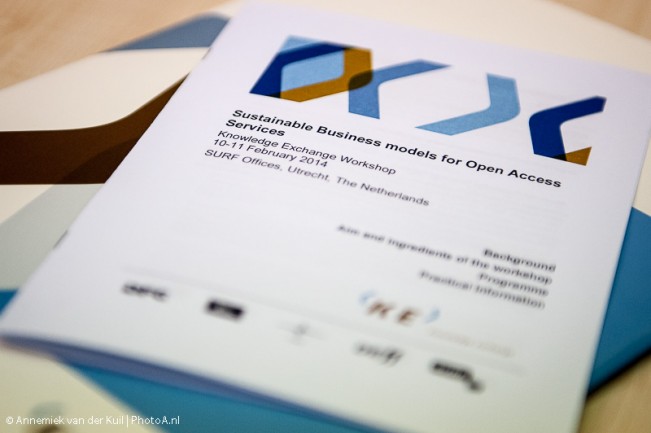
Phase 5: Workshop: Sustainable Business Models for Open Access Services
Following work on the previous phases of the study, we identified that organisations which exist to provide services to the Open Access community, need to have a business-like approach and that the absence of rigorous attention to all aspects of the business may lead to sub-optimal performance and potentially, failure.
With this in mind, over fifty participants, representing Open Access service providers, IT-infrastructure and research funders, and users, attended the Knowledge Exchange workshop 'Sustainable Business Models for Open Access Services, which took place on the 10-11 February 2014, in Utrecht.
Attendees worked to make past recommendations from KE work on Open Access actionable, resulting the outcome of the workshop the Knowledge Exchange Sustainability Index.
The Sustainability Index is;
- a useful tool for directors and managers of an organisation. It provides a helicopter view which allows them to identify essential skills or business-related activities required to run a sustainable OA-ready organisation
- helps funders to refer grant applicants to required business skills and provisions that are essential for sustainable post-project phase
- pays attention to state of development of the service, to business and financial skills, and to other essential aspects that influence successful, sustainable open access service provision
